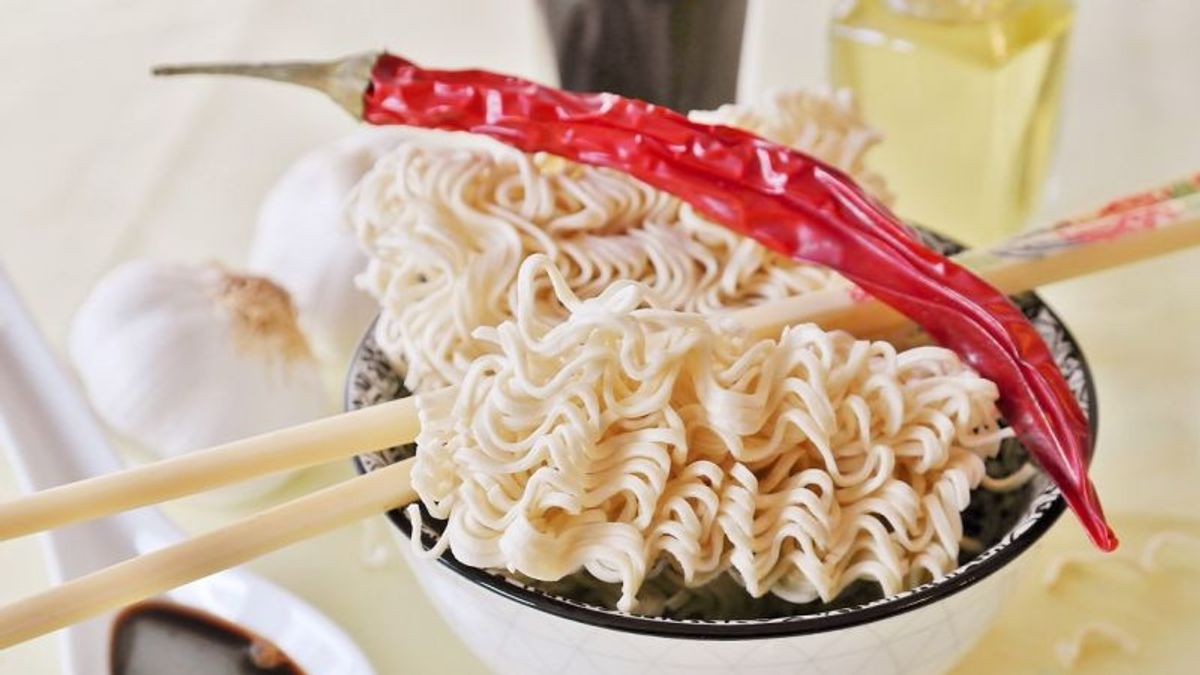JAKARTA - Instant noodle products from Indonesia with the Mie Sedaap trademark are withdrawn from various countries such as Taiwan, Hong Kong, and Singapore.
The reason is because the instant noodle product produced by Wings Food is suspected to contain Etylene Oksida residue.
Responding to this, the Director General of Agro Industry at the Ministry of Industry, Putu Juli Ardika, emphasized that every food and beverage product produced by domestic industries has followed the prevailing food standards in Indonesia.
While products that have penetrated the export market, these products have also followed the standards of the export destination country.
"Of course, companies in exporting food abroad must know the regulations applied by these export destination countries, as well as meet the required quality and food safety standards," said Putu, in Jakarta, Friday, October 21.
Data from the World Instant winningDS Association (WINA), in 2021 Indonesia is the second country with the largest instant noodle consumption rate in the world reaching 13.27 billion packs, or 11.2 percent of the world's instant noodle consumption of 118.18 billion packs.
Domestic instant noodle production in 2021 will reach 1.2 million tons with an export volume of 153,000 tons or worth 246 million US dollars.
Regarding the withdrawal of a number of instant noodle products produced by Wings Group Indonesia, Putu said that his party was taking mitigation steps. Among other things, by strengthening the Indonesia Rapid Alert System for Food and Feed (INRASFF) working group from relevant stakeholders.
Representatives of stakeholders, for example from BPOM (as a National Contact Point), Kemenperin, Ministry of Trade, Ministry of Agriculture, Ministry of Maritime Affairs and Fisheries, Ministry of Health, and Ministry of Finance. "INRASFF is a fast communication system to follow up on notifications on export and import product problems," he said. In addition, Putu continued, it is necessary to develop a method of testing Etylene Oksida's residue on food products. Currently, in Indonesia, testing the residue can only be done by BPOM laboratories. Wings Food Make sure Not Use Etylene Oksida
Director of Wings Group Indonesia Ricky Tjahjono said the company had confirmed that the Mi Sedaap production process did not use Etylene Oksida.
Ricky emphasized that Mie Sedaap's production is also in accordance with applicable food safety provisions, including a distribution permit from BPOM and the ISO 22000 food safety system so that it is safe to consume.
"Mi Sedaap products have been exported to more than 30 countries. Wings Group Indonesia is currently investigating all lines of production and marketing of Mi Sedaap," said Ricky.
Ricky said, his company has also withdrawn all variants of Mie Sedaap products that entered Hong Kong, Taiwan, and Singapore.
Furthermore, Ricky revealed that Wings Group Indonesia had sent instant noodle samples to PT Saraswanti Indo Genetech which then sub-contacted to a laboratory in Vietnam for Etylene Oksida's test in early October 2022.
"In addition, the company has replaced the use of powder chilies which in the fumigas process do not use Etylene Oksida, but uses Steam Sterilization Technology from China and India, since early September 2022," he explained.
Meanwhile, Prof. Purwiyatno Hariyadi from the Bogor Agricultural Institute (IPB) said that regulations regarding Oksida Ethilen in various countries in the world have various implementations, there are countries that prohibit its use, but some still allow its use.
"Indonesia is a country that prohibits the use of Ethilen Oksida for pesticides or active substances for pesticides and foodstuffs (fumigation), but still uses it to sterilize medical devices," he explained.
With these diverse regulations, the maximum limit of residue (BMR) on food is also different in each country. One of the regions that apply the strictest BMR regulations is the European Union.
"There are also several countries that have not determined BMR, so the BMR determined by each country is different, namely, there are those that determine 0.01 ppm or some even require not being detected. Currently, international organizations are below WHO/FAO, namely Codex Alimentarius Commission has not set a maximum limit on Etylene Oksida's residue," said Purwiyatno.
The English, Chinese, Japanese, Arabic, and French versions are automatically generated by the AI. So there may still be inaccuracies in translating, please always see Indonesian as our main language. (system supported by DigitalSiber.id)













